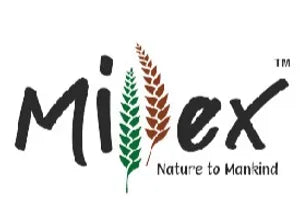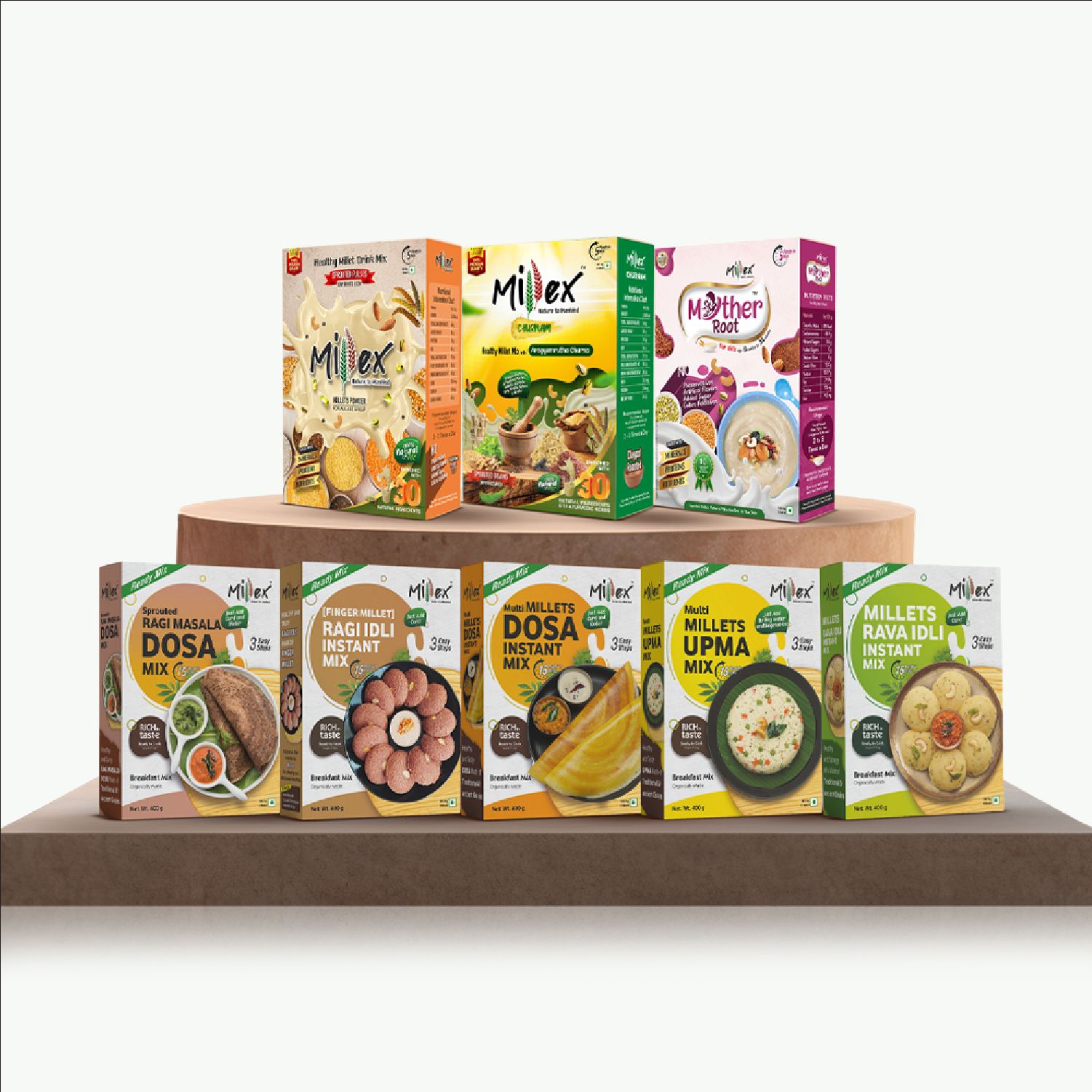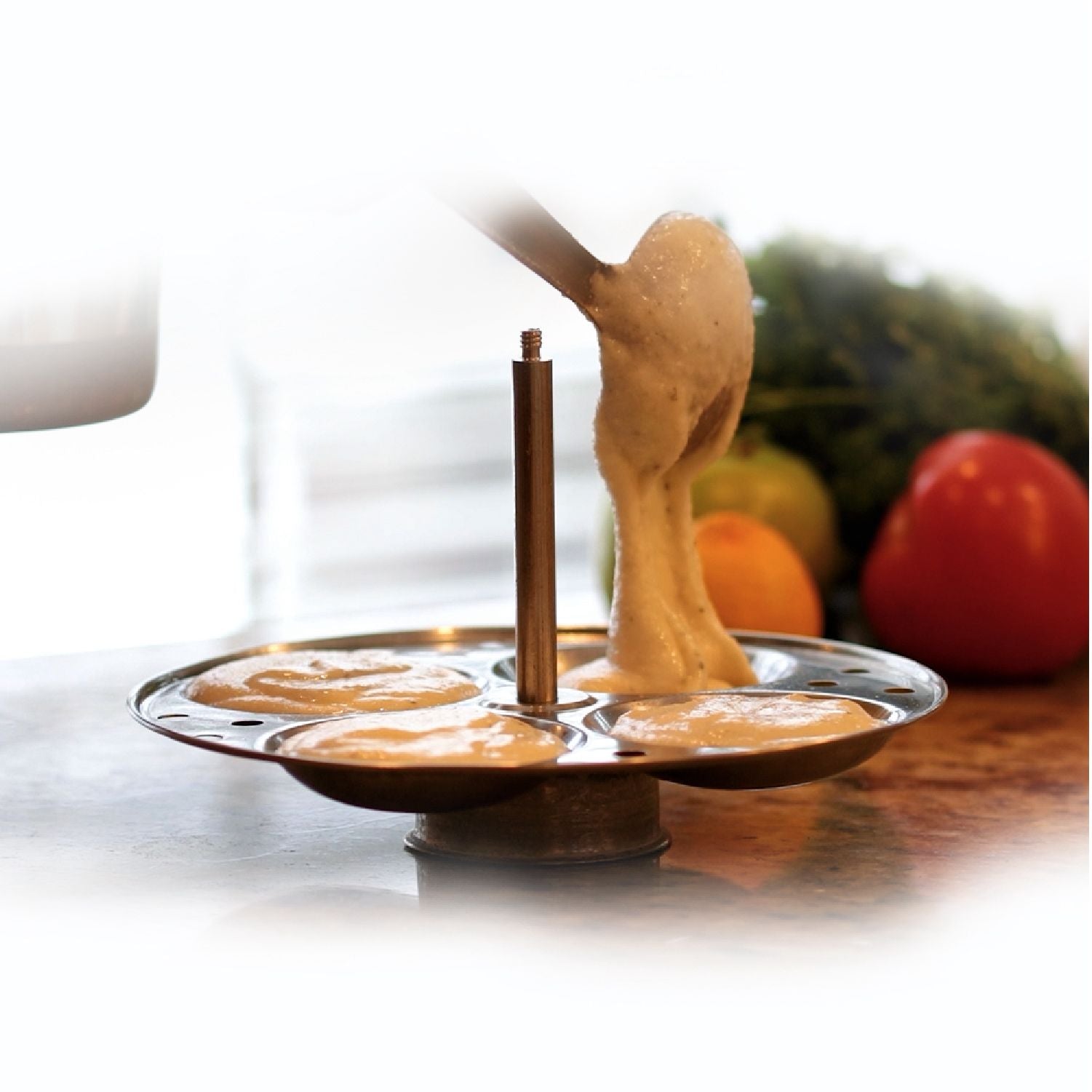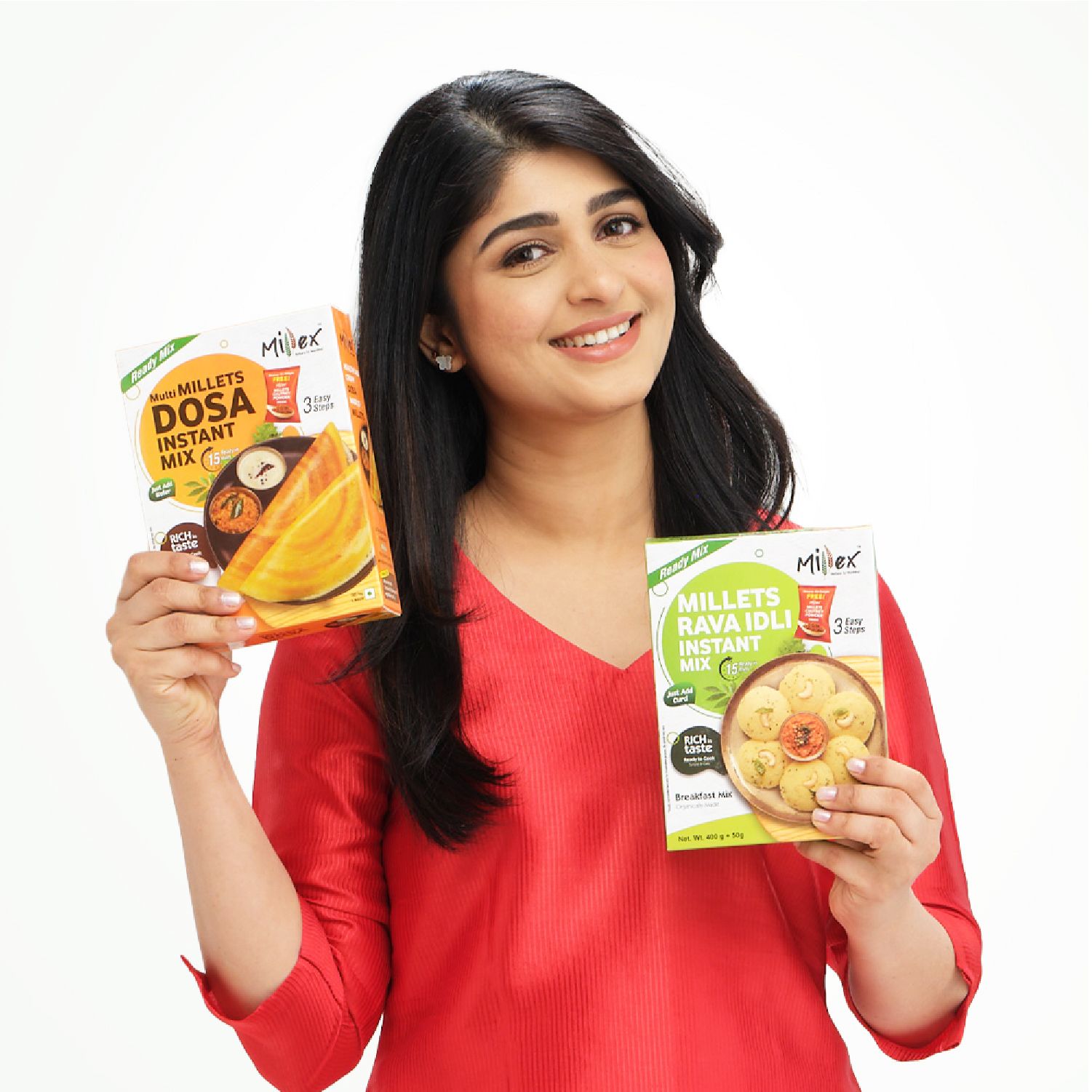Globally, 1.71 billion people suffer from a bone disease. Healthy bones allow you to move, protect your vital organs, and store the nutrients and minerals that support bone life. Poor bone health increases an individual's chance of pain and fractures, which can result in other severe physical disorders such as restricted movement.
As part of a balanced diet, millets, a group of small-seeded grains, are truly nutrient-dense and can support bone health. Taking Millex Millet Health Mix with Churnam will address many bone problems and provide many health advantages.
This pack included a variety of nutritious nuts and spices to encourage people to lead healthy lives, including almonds, cashew nuts, pistachios, cardamom, pumpkin, watermelon, chia, flax, makhana, or lotus seeds, fenugreek, and black pepper.
Are Millets Good For Bones?
Millets have a rich nutritional profile that promotes healthy bone health. Millets like finger millet and pearl millet, which are rich in vital minerals like calcium, magnesium, and phosphorus, help strengthen bones.
These grains are high in calcium, helps to keep bones in good condition. They are a good source of calcium, which is necessary to keep bones strong. Millets include other vital nutrients such as phosphate and magnesium for bone growth and maintenance.
When included in a balanced diet, these grains can help maintain the general health of your bones. However, it is crucial to remember that maintaining strong bones also requires eating a well-rounded diet. It includes other calcium-rich foods like dairy products and leafy greens, getting regular exercise, and getting vitamin D from sunshine.
Furthermore, millet provides phosphorus, which is essential for bone structure, and magnesium, which helps with the absorption of calcium. Additionally, some millets include vitamin K, which promotes bone metabolism and lowers the risk of fractures. Taking millet health mix powder helps maintain bone health in an excellent condition.
Millets Are a Rich Source Of Calcium:
Calcium is a crucial mineral for bone strength, and millets contain some amount of calcium. However, it is important to note that millet is not as rich in calcium as dairy products or certain leafy greens like kale or collard. A varied diet rich in foods high in calcium is recommended to promote healthy bones.
The mineral calcium, which is essential for strong bones and general bone health, can be found in millets. Incorporating millet into your diet can contribute to your daily calcium intake, which is essential for bone density and preventing conditions like osteoporosis. However, it is crucial to remember that vitamin D also affects calcium absorption, so ensuring you get enough of it from food or sun exposure is essential.
Millets can be an important part of a strategy to meet your calcium needs and to maintain strong, healthy bones, especially when combined with other nutrients from a well-balanced diet.
How Can Millets Prevent Bone Disease?
Millets may help prevent osteoporosis due to their nutritional composition, which includes essential minerals, calcium, magnesium, phosphorus, and other micronutrients that support bone health.
Calcium
Finger millet and pearl millet are two significant sources of calcium, which is necessary for maintaining bone strength and density. Getting enough calcium throughout life is crucial to preserving and growing bone mass, lowering the chance of osteoporosis, a disorder marked by weakening bones that are more likely to break.
Adding calcium-rich millet to your diet gives your body an organic supply of this essential nutrient, strengthening your skeletal system. A pack of mixed millet powder contains high calcium, which helps maintain bone density.
Magnesium and Phosphorus
Millets are a good source of magnesium and phosphorus, in addition to calcium, two essential minerals for healthy bones. Magnesium is essential for the absorption of calcium and the development of new bone. It ensures that the calcium taken from food is used efficiently to keep bones strong.
However, phosphorus strengthens and structures bones by combining calcium and magnesium to increase skeletal resilience. For a comprehensive approach to skeletal well-being, millets such as pearl millet and foxtail millet are excellent suppliers of essential elements beneficial to the bones.
Vitamins and Antioxidants
Millets are rich in antioxidants and various vitamins, which contribute to their ability to protect bones. Some millets include vitamin K, essential for bone metabolism since it helps with calcium uptake and mineralization.
You can promote optimal bone health and lower your risk of osteoporosis-related fractures by eating enough millet to ensure your diet contains enough vitamin K. Furthermore, oxidative stress and inflammation are two factors that lead to bone loss and degeneration. You may foster a long and healthy bone life by including antioxidant-rich millets.
Different Types of Millets
There are various types of millets are available some are listed below:
Pearl Millets
Pearl millets, sometimes referred to as Bajra, are high in minerals, proteins, fiber, and carbohydrates. They contain vitamin B and are rich in minerals like iron, magnesium, calcium, phosphorus, manganese, potassium, copper, zinc, and chromium.
It is the only grain that has a noticeable amount of chromium. It has many nutrients and is readily digested. It also eases constipation, lessens bone pain, and treats iron deficiency.
Little Millets
A healthy, gluten-free, non-sticky, and acid-forming grain, little millets. They aid in promoting health by warding off many ailments and are a good source of numerous antioxidants. Its fat content is likewise high.
Magnesium, present in little millet, can strengthen bones and heart health. Little millet contains vitamin B3, which lowers cholesterol. Additionally, it is rich in phosphorus, which aids in energy production, fat metabolism, and bodily tissue repair. Little millet is a great source of this mineral.
Foxtail Millets
Foxtail millets have several health benefits, including lowering bad cholesterol, preventing aging, assisting with weight loss, and promoting detoxification. It greatly increases your strength because it contains a lot of calcium.
This specific type of millet has a high carb content, which is necessary to maintain the body's normal blood sugar levels. It also has a high iron content. Eating this type of millet will strengthen your immune system overall.
Foxtail millet, has been demonstrated to help reduce bad cholesterol, delay aging, and manage diabetes. Its high calcium concentration strengthens bones. It also helps to promote healthy weight loss and blood pressure control.
Sorghum
Jowar, a beloved term for sorghum, is a superb source of dietary fiber that significantly enhances digestive health. Due to its high potassium content and low salt content, it aids in maintaining a healthy blood pressure level.
Sorghum has many advantages, such as being gluten-free, a fantastic food for diabetics, a good source of protein, and a rich supply of important minerals.
Compared to other grains, it is more sustainable, rich in antioxidants, a fantastic source of protein for vegetarians and vegans, helps you lose weight, maintains the health of your digestive system, and improves bone health.
Barnyard Millets
Barnyard millets, sometimes referred to as Sanwa, are rich in protein but low in calories. They are a great source of fiber and reduce bloating, constipation, cramping, and acidity. They also strengthen bones by supplying the necessary nutrients.
These are the best foods for people with diabetes because they have a low glycemic index. This millet, like the others, prevents anemia because it is high in iron.
Finger Millet
One of the most significant natural calcium sources is finger millet, which supports healthy bones in both growing youngsters and older adults. The high nutritional value of ragi flour makes it a recommended diet during weaning.
Eating finger millet is an excellent way to recover from anemia because it is a natural supply of iron. It helps with depression, anxiety, and migraines. It is also helpful for insomnia.
Browntop Millet
Browntop Millet is a notable ally for digestive health. The reason is its high fiber content. Dietary fiber encourages frequent bowel movements, which helps alleviate constipation successfully.
While Browntop Millet aids digestion, it also contains vital amino acids aiding muscle growth and maintenance. It is a low-calorie grain that provides nutrients without adding many calories, making it a smart option for diets that aim to reduce body weight.
The antioxidants and other phytochemicals in brown top millet have been studied for their potential to prevent cancer. They counteract free radicals and prevent the growth of cancer cells. Brown top millet also helps maintain, strong and healthy bones.
To Maintain Bone Health, Incorporate Millex Millet Health Mix with Churnam Daily:
Millex Healthy Millet Mix is a traditional blend of many varieties of natural ingredients, including millets, cereals, pulses, dry fruits, nuts, seeds, and spices.
This pack is quite helpful in enhancing the density and health of bones. They offer a potent combination of carbohydrates, protein, and healthy fats for bone energy. Each ingredient has a high level of vitamins and minerals.
This mixture also contains the Arogyamrutha Churna, an Ayurvedic herb powder that strengthens immunity against viral infections and offers extra health advantages.






